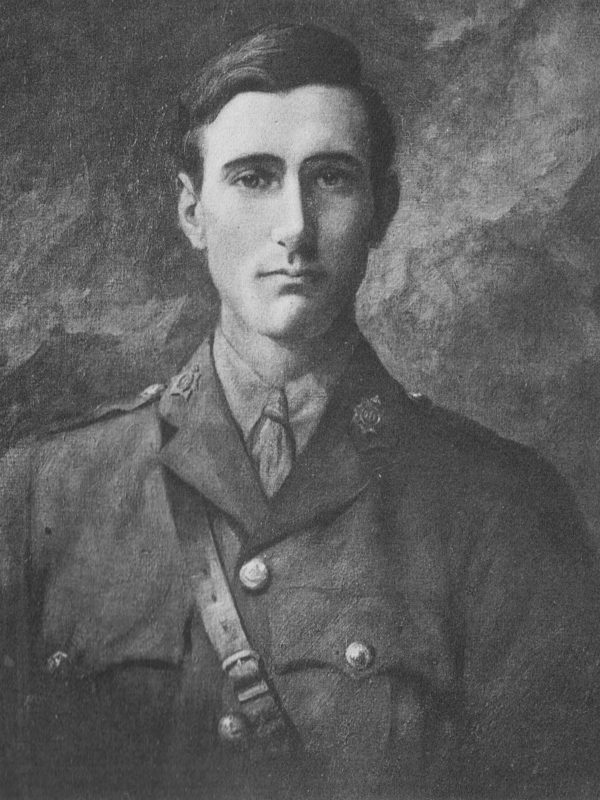Died: 13th February 1917
Age: 24
Edward Stanley Hudson, elder son of the Reverend EFW Hudson, of Saunton, Devon, was born 20th October, 1892. He entered [Victoria] College with his younger brother Godfrey in 1906 and remained till 1911, when both went up to the University. In his last year he won the States Gold Medal for French and gained a Channel Islands Scholarship for the same subject at Exeter College, Oxford.
Both brothers finished their University career in the summer of 1914 with a First Class, Edward in Modern Languages at Oxford, Godfrey in Law at Cambridge. From a child he had been a keen reader, especially history and geography. Before he was eight years old he kept an atlas and gazetteer at his bedside, for study in the early morning. During his school life at Jersey he derived much stimulus from several visits to France, particularly to Caen, where he studied French literature and criticism under Professor Lebonnois. He was one of the servers at St. Luke’s Church, Jersey, taking a great interest in the Guild of Servants of the Sanctuary, and later on used his musical powers for he was an
accomplished pianist in the little country church at Saunton. It is not surprising that, with such interests and such gifts, he threw himself with enthusiasm into the Oxford life, being, as a friend recalls, “certainly one of the most popular men of our year at Exeter.” He had a capacity for deep friendship: he was never jealous, never envious, always ready to appreciate the merits of others. On one occasion the Rector of Exeter wrote of him: “He has given us all the impression, not only of considerable ability, but of an exceptionally high sense of right and religious feeling.”
On the very day on which war was declared he was to have gone to Wells Theological College. He enlisted instead in the 2nd Public Schools Battalion of The Royal Fusiliers and in 1915 received a commission in the 10th Battalion, The Devonshire Regiment.
In the following November, he sailed for Egypt and Salonica, never to return. Those who saw him at that time will gratefully remember his fine presence – he was six feet three in height – his handsome face and his animated conversation.
He had been a delicate child, and on the Salonica front he suffered a good deal from sickness, but his letters were always cheerful, with large plans for study. He developed an enthusiasm for the Greek language, with demands for various books. Another letter announced that the mess was going to learn Spanish. Another that he was going to compete for the Cromer Greek Prize at Oxford, while yet another asked for books on psychology.
He was wounded slightly on 30th December, 1916, but soon re-joined his Battalion. Then he was wounded again on 12th February, 1917, and died the next day. His Company Commander wrote: “His Platoon loved him to a man. He was conscientious in all his duties, and withal absolutely fearless. In the Company Mess – his temporary home – he was always the intellectual figurehead: and we, one and all, had the profoundest respect for his views on many varied topics.”
The announcement of his death called forth many tributes. The Rector of Exeter College wrote: “I knew him well throughout his distinguished career at Oxford, and anticipated a brilliant future for him.” The Sub-Rector wrote: “He had a distinguished career as an undergraduate of this College, and we were all hoping this would be but the prelude to a life full of service and happiness.” A College friend wrote: “He was a man with singular intellectual gifts and the highest ideals of anyone whom I have ever met.”
But if he was admirable for his abilities, he was even more admirable for his family affection. He loved his home: he never craved excitement elsewhere. He was happy with his books, with his plans, with his music, with his relatives.
The above text appeared in the Victoria College Book of Remembrance published in 1920.
The link to the Commonwealth war Grave Commission website is:

